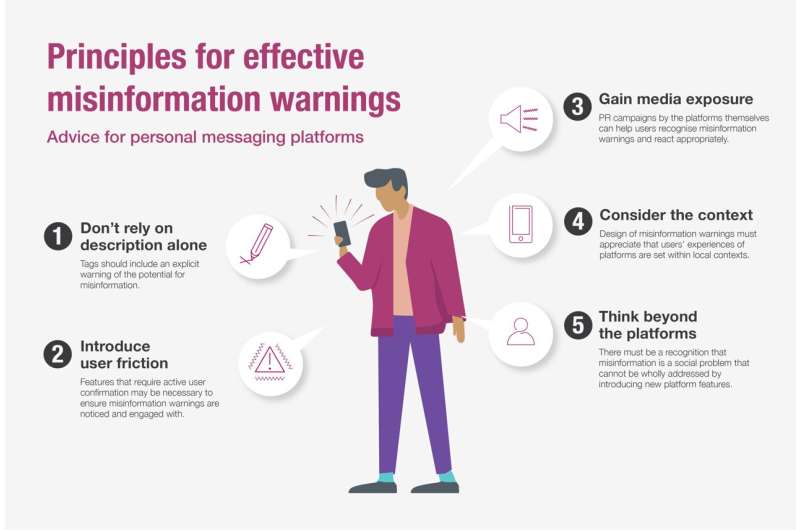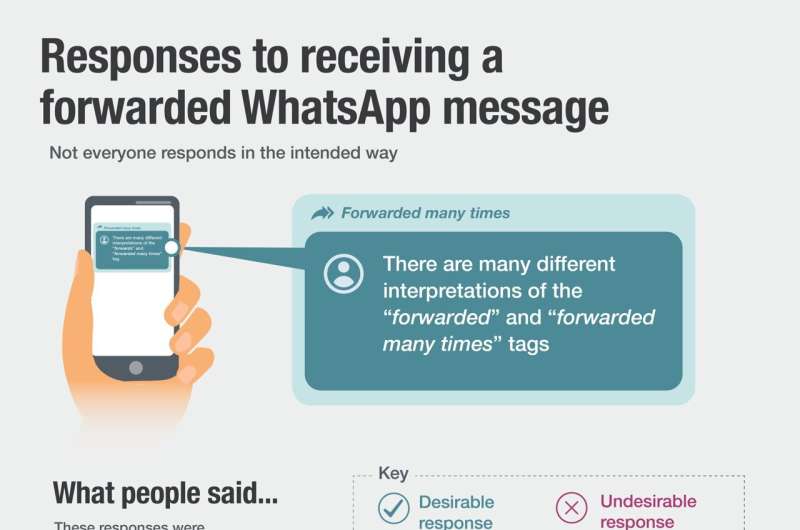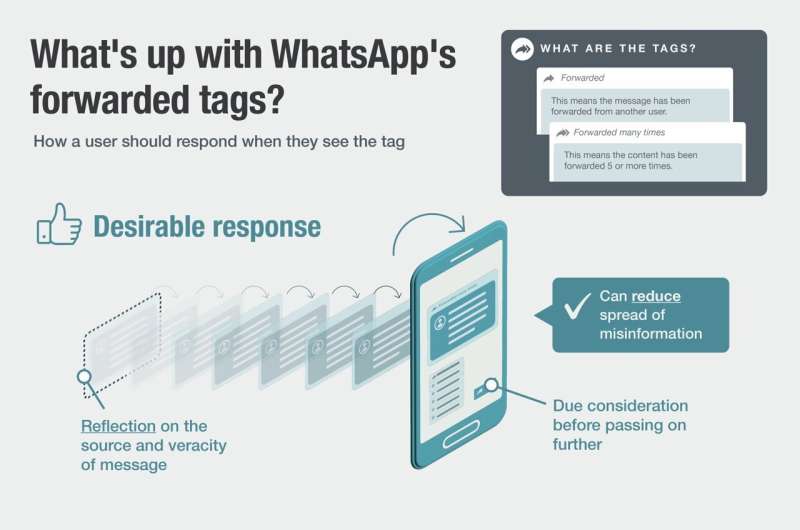WhatsApp’s ‘forwarded’ and ‘forwarded many times’ tags are misunderstood by users: Report
The purpose of WhatsApp’s “forwarded” and “forwarded many times” tags are often misunderstood by users and consequently may not stop the spread of misinformation, a new report suggests.
The Loughborough University report, by Dr. Natalie-Anne Hall, Dr. Brendan T Lawson, Professor Cristian Vaccari, and Professor Andrew Chadwick, shares the findings of a study that interviewed 102 U.K. messaging app users at length about their experiences on the popular personal messaging platform.
Misinformation can spread extremely quickly through WhatsApp—with high-profile cases emerging over the past five years—as the forwarding function allows users to easily send content from one conversation to another.
WhatsApp introduced the “forwarded” and “forwarded many times” tags to alert users that the content has passed through multiple conversations and to prompt them to critically reflect on the source of the message before passing it on.
However, until now, the effectiveness of the tags was unclear.
The findings of the Loughborough University study indicate that not all users understand the purpose of the tags, and, in some cases, they do more harm than good when it comes to tackling misinformation.
The researchers found:
- Users’ interpretations of the tags vary
- Some participants did not see the tags as meaningful at all
- Some participants did see the tags as markers of potential misinformation because they were aware of the context around the introduction of the tags
- Other participants who did consider the tags as a sign that content should not be passed on actually associated the tags with inappropriate jokes or irrelevant content rather than misinformation
- Some users treated the tags as a sign of importance, and this may help spread misinformation rather than stem it.

Dr. Hall said of the findings, “We found that people have a variety of interpretations of the tags, some of which match that intended by WhatsApp, but a significant set of users imbued the tags with other meanings. These different—and often conflicting—interpretations of the tags pose a problem for WhatsApp’s current approach to combatting misinformation.
“Even among those who did consider the tags a sign that content should not be passed on, a significant group did not take the opportunity to think critically about whether a message might contain misinformation. If people don’t make the association between the tags and misinformation—and don’t critically engage with the source before considering whether to pass messages on—this anti-misinformation measure may be less effective than presumed.”
Dr. Lawson added, “Worryingly, a group of participants associated the tags with socially relevant or practical content that had gone viral. Here, content that had passed through multiple conversations was seen as a marker of importance rather than potential misinformation.
“While our findings are exploratory—and our sample size means we cannot make claims about the general population—our interviews suggest that this technological solution could be having the opposite effect on some of WhatsApp’s users.”
The report, which is the latest from the Everyday Misinformation Project, looks to highlight that “quick fix” technological solutions are not the way for personal messaging platforms to tackle misinformation.
To aid in the designing of effective misinformation warnings, the researchers have proposed five principles that can be adopted by personal messaging platforms, even within the confines of highly valued end-to-end encryption.

The report covers each recommendation in depth. In brief, they are:
- Don’t rely on description alone
- Introduce user friction
- Gain media exposure
- Consider the context
- Think beyond the platform.
The report’s authors commented, “Personal messaging users rightly value the privacy that end-to-end encryption provides, but this presents challenges for tackling misinformation.
“Meta, which owns WhatsApp, has designed these tags to encourage sharing and avoid tarnishing its brand with associations between its platform and the spread of misinformation. But this approach inhibits the effectiveness of misinformation warnings. To overcome the kinds of ambiguous user interpretations we reveal in this report, the connection between forwards and the potential spread of misinformation ought to be made more explicit for users.
“These five principles are designed to guide platforms that seek to design effective solutions without compromising encryption. This is becoming increasingly important in the context of the UK’s forthcoming Online Safety Bill.”
More information:
Beyond Quick Fixes: How Users Make Sense of Misinformation Warnings on Personal Messaging: www.lboro.ac.uk/research/onlin … -beyond-quick-fixes/
Citation:
WhatsApp’s ‘forwarded’ and ‘forwarded many times’ tags are misunderstood by users: Report (2023, June 29)
retrieved 29 June 2023
from https://phys.org/news/2023-06-whatsapp-forwarded-tags-misunderstood-users.html
This document is subject to copyright. Apart from any fair dealing for the purpose of private study or research, no
part may be reproduced without the written permission. The content is provided for information purposes only.

The purpose of WhatsApp’s “forwarded” and “forwarded many times” tags are often misunderstood by users and consequently may not stop the spread of misinformation, a new report suggests.
The Loughborough University report, by Dr. Natalie-Anne Hall, Dr. Brendan T Lawson, Professor Cristian Vaccari, and Professor Andrew Chadwick, shares the findings of a study that interviewed 102 U.K. messaging app users at length about their experiences on the popular personal messaging platform.
Misinformation can spread extremely quickly through WhatsApp—with high-profile cases emerging over the past five years—as the forwarding function allows users to easily send content from one conversation to another.
WhatsApp introduced the “forwarded” and “forwarded many times” tags to alert users that the content has passed through multiple conversations and to prompt them to critically reflect on the source of the message before passing it on.
However, until now, the effectiveness of the tags was unclear.
The findings of the Loughborough University study indicate that not all users understand the purpose of the tags, and, in some cases, they do more harm than good when it comes to tackling misinformation.
The researchers found:
- Users’ interpretations of the tags vary
- Some participants did not see the tags as meaningful at all
- Some participants did see the tags as markers of potential misinformation because they were aware of the context around the introduction of the tags
- Other participants who did consider the tags as a sign that content should not be passed on actually associated the tags with inappropriate jokes or irrelevant content rather than misinformation
- Some users treated the tags as a sign of importance, and this may help spread misinformation rather than stem it.

Dr. Hall said of the findings, “We found that people have a variety of interpretations of the tags, some of which match that intended by WhatsApp, but a significant set of users imbued the tags with other meanings. These different—and often conflicting—interpretations of the tags pose a problem for WhatsApp’s current approach to combatting misinformation.
“Even among those who did consider the tags a sign that content should not be passed on, a significant group did not take the opportunity to think critically about whether a message might contain misinformation. If people don’t make the association between the tags and misinformation—and don’t critically engage with the source before considering whether to pass messages on—this anti-misinformation measure may be less effective than presumed.”
Dr. Lawson added, “Worryingly, a group of participants associated the tags with socially relevant or practical content that had gone viral. Here, content that had passed through multiple conversations was seen as a marker of importance rather than potential misinformation.
“While our findings are exploratory—and our sample size means we cannot make claims about the general population—our interviews suggest that this technological solution could be having the opposite effect on some of WhatsApp’s users.”
The report, which is the latest from the Everyday Misinformation Project, looks to highlight that “quick fix” technological solutions are not the way for personal messaging platforms to tackle misinformation.
To aid in the designing of effective misinformation warnings, the researchers have proposed five principles that can be adopted by personal messaging platforms, even within the confines of highly valued end-to-end encryption.

The report covers each recommendation in depth. In brief, they are:
- Don’t rely on description alone
- Introduce user friction
- Gain media exposure
- Consider the context
- Think beyond the platform.
The report’s authors commented, “Personal messaging users rightly value the privacy that end-to-end encryption provides, but this presents challenges for tackling misinformation.
“Meta, which owns WhatsApp, has designed these tags to encourage sharing and avoid tarnishing its brand with associations between its platform and the spread of misinformation. But this approach inhibits the effectiveness of misinformation warnings. To overcome the kinds of ambiguous user interpretations we reveal in this report, the connection between forwards and the potential spread of misinformation ought to be made more explicit for users.
“These five principles are designed to guide platforms that seek to design effective solutions without compromising encryption. This is becoming increasingly important in the context of the UK’s forthcoming Online Safety Bill.”
More information:
Beyond Quick Fixes: How Users Make Sense of Misinformation Warnings on Personal Messaging: www.lboro.ac.uk/research/onlin … -beyond-quick-fixes/
Citation:
WhatsApp’s ‘forwarded’ and ‘forwarded many times’ tags are misunderstood by users: Report (2023, June 29)
retrieved 29 June 2023
from https://phys.org/news/2023-06-whatsapp-forwarded-tags-misunderstood-users.html
This document is subject to copyright. Apart from any fair dealing for the purpose of private study or research, no
part may be reproduced without the written permission. The content is provided for information purposes only.
